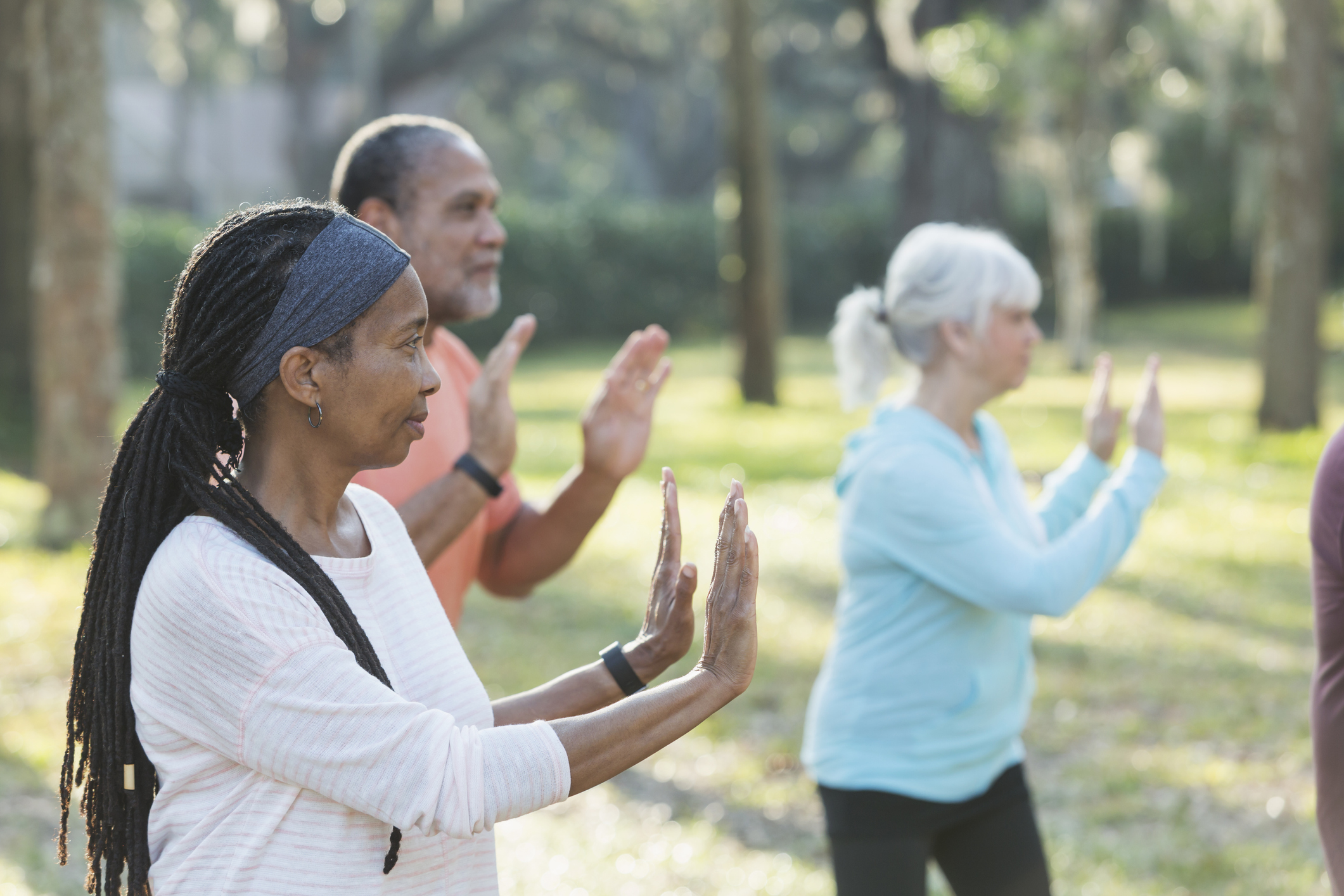In the U.S., falls are the leading cause of injury and death from injury in adults 65 years and older. Falls can also lead to disability and loss of independence for older adults. Falls prevention programs can help, but the COVID-19 pandemic has postponed programs or forced them online.
The University of Iowa Hospitals and Clinic’s (UIHC) Injury Prevention Specialist, Kathy Lee, has rolled out two falls prevention programs in Johnson County, Iowa, for older adults including Stepping On and Tai Chi for Arthritis and Fall Prevention. The hospital is continuing to offer Tai Chi for Arthritis and Fall Prevention virtually using the University of Iowa Zoom platform during the pandemic.
“Programs aimed at increasing knowledge about medications and home modifications along with exercises to increase strength and balance have been shown to reduce falls,” she said, “Unfortunately, the face-to-face interaction that is such a positive part of the participant experience in the fall prevention programs is impossible. But with modifications, participants can still learn exercises that increase their strength and balance.”

Lee said one instructor provides instruction while another runs the Zoom class and provides technical support for class members. At the end, both instructors discuss learning needs with the class and answer questions.
“Although the virtual discussion groups do not replace the whole experience of face-to-face contact, the virtual participants can see each other and tell us they value the sense of a group experience,” she said.
This online interaction is especially important, Lee said, because the pandemic has increased isolation, especially among older adults, who are at greater risk for serious complications of COVID-19.
“As we do follow up calls with past members of our fall prevention programs, we are hearing from some people that they are experiencing anxiety and feelings of loneliness because of curtailed in-person visits from friends and family,” she said.
While the Tai Chi for Arthritis and Fall Prevention program continues online, the hospital’s Stepping On program is currently on hold due to the pandemic. UIHC researchers evaluating falls prevention programs, in particular Stepping On, have found that participants of these programs reported feeling much more confident about their ability to prevent falling. In addition, early data is showing that participants fell less 12 months after completing the 7-week Stepping On program than prior to the program.

Colette Galet, Associate Research Scientist for the University of Iowa Trauma Center, said a UIHC study that evaluates changes in frailty of past falls prevention program participants is also on hold because of COVID-19. One of her team’s previous studies found that older adults who repeatedly fell were more likely to be frail (i.e. poor physical condition associated with aging).
“We hope that our results will raise awareness on the importance of frailty in falls for patients, families, and providers,” she said. “Screening for frailty by medical providers in the community is needed to identify frail and pre-frail patients.”
Once identified for frailty, Galet said, patients can benefit from improvements in medication management, nutritional status, mobility, and mental health.
“Additionally, frailty scoring could be utilized by primary care physicians or geriatricians to refer their patients to fall prevention programs or adapted exercise programs,” Galet said. “Through this process, patients and families may learn that a different or modified living environment may be necessary to mitigate fall risk before a fall [hospital] admission.”

The UIHC’s next online 8-week (two times per week) Tai Chi for Arthritis and Fall Prevention course begins September 21, 2020, and requires some basic strength and balance to enroll in the standing version of the class. The hospital also provides the online pre-recorded version of the class to all participants and includes a pre-recorded seated version for people with impaired mobility.
Before the pandemic, Lee said, participants of Tai Chi for Arthritis and Fall Prevention reported making new friends and exercising together following the program.
“Our participants formed a practice group that meets weekly to practice the Tai Chi form they learned in the class,” she said. “They continue to meet via Zoom and all new participants will be invited to join the group.”
A falls prevention toolkit for Iowa
Linking older adults to falls prevention programs that exist within a community is an important part of reducing falls. The University of Iowa Injury Prevention Research Center (UI IPRC) has worked with a stakeholder advisory board of organizations serving older adults to create RW-PLUS (Remembering WhenTM Partners Linking yoU to Services) in Burlington and Cedar Rapids, Iowa. This infrastructure refers older adults to falls prevention programming, such as Tai Chi for Arthritis and Fall Prevention and Stepping On.
Now, the UI IPRC team, led by center director Carri Casteel and center evaluator Sato Ashida, is developing a falls prevention toolkit that will launch this winter for all communities. The toolkit will provide step-by-step guidance, with examples, of how community organizations can develop and sustain a referral infrastructure that engages and supports independent older adults in falls prevention programming in their communities.
“We will also launch an online version of this toolkit,” Casteel said. “We hope that community organizations that serve older adult populations will find the toolkit a valuable resource for reaching high risk older adults and developing networks to them with available programming.”
Resources:
Older adult falls, info from the CDC
Older adults and depression, the National Institute of Mental Health
Published September 15, 2020